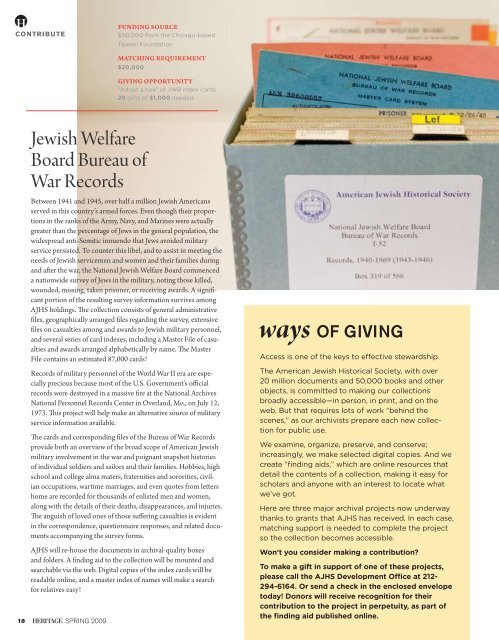Beyond the Pale - American Jewish Historical Society
Beyond the Pale - American Jewish Historical Society
Beyond the Pale - American Jewish Historical Society
You also want an ePaper? Increase the reach of your titles
YUMPU automatically turns print PDFs into web optimized ePapers that Google loves.
H<br />
contribute<br />
<strong>Jewish</strong> Welfare<br />
Board Bureau of<br />
War Records<br />
Between 1941 and 1945, over half a million <strong>Jewish</strong> <strong>American</strong>s<br />
served in this country’s armed forces. Even though <strong>the</strong>ir proportions<br />
in <strong>the</strong> ranks of <strong>the</strong> Army, Navy, and Marines were actually<br />
greater than <strong>the</strong> percentage of Jews in <strong>the</strong> general population, <strong>the</strong><br />
widespread anti-Semitic innuendo that Jews avoided military<br />
service persisted. to counter this libel, and to assist in meeting <strong>the</strong><br />
needs of <strong>Jewish</strong> servicemen and women and <strong>the</strong>ir families during<br />
and after <strong>the</strong> war, <strong>the</strong> National <strong>Jewish</strong> Welfare Board commenced<br />
a nationwide survey of Jews in <strong>the</strong> military, noting those killed,<br />
wounded, missing, taken prisoner, or receiving awards. A significant<br />
portion of <strong>the</strong> resulting survey information survives among<br />
AJHS holdings. The collection consists of general administrative<br />
files, geographically arranged files regarding <strong>the</strong> survey, extensive<br />
files on casualties among and awards to <strong>Jewish</strong> military personnel,<br />
and several series of card indexes, including a Master File of casualties<br />
and awards arranged alphabetically by name. The Master<br />
File contains an estimated 87,000 cards!<br />
Records of military personnel of <strong>the</strong> World War ii era are especially<br />
precious because most of <strong>the</strong> U.S. Government’s official<br />
records were destroyed in a massive fire at <strong>the</strong> National Archives<br />
National Personnel Records Center in Overland, Mo., on July 12,<br />
1973. This project will help make an alternative source of military<br />
service information available.<br />
The cards and corresponding files of <strong>the</strong> Bureau of War Records<br />
provide both an overview of <strong>the</strong> broad scope of <strong>American</strong> <strong>Jewish</strong><br />
military involvement in <strong>the</strong> war and poignant snapshot histories<br />
of individual soldiers and sailors and <strong>the</strong>ir families. Hobbies, high<br />
school and college alma maters, fraternities and sororities, civilian<br />
occupations, wartime marriages, and even quotes from letters<br />
home are recorded for thousands of enlisted men and women,<br />
along with <strong>the</strong> details of <strong>the</strong>ir deaths, disappearances, and injuries.<br />
The anguish of loved ones of those suffering casualties is evident<br />
in <strong>the</strong> correspondence, questionnaire responses, and related documents<br />
accompanying <strong>the</strong> survey forms.<br />
AJHS will re-house <strong>the</strong> documents in archival-quality boxes<br />
and folders. A finding aid to <strong>the</strong> collection will be mounted and<br />
searchable via <strong>the</strong> web. Digital copies of <strong>the</strong> index cards will be<br />
readable online, and a master index of names will make a search<br />
for relatives easy!<br />
18 HERITAGE Spring 2009<br />
Funding source<br />
$50,000 from <strong>the</strong> Chicago-based<br />
tawani Foundation<br />
Matching requireMent<br />
$20,000<br />
giving opportunity<br />
“adopt a box” of JWB index cards<br />
20 gifts of $1,000 needed<br />
ways of GiVinG<br />
access is one of <strong>the</strong> keys to effective stewardship.<br />
<strong>the</strong> american <strong>Jewish</strong> <strong>Historical</strong> <strong>Society</strong>, with over<br />
20 million documents and 50,000 books and o<strong>the</strong>r<br />
objects, is committed to making our collections<br />
broadly accessible—in person, in print, and on <strong>the</strong><br />
web. But that requires lots of work “behind <strong>the</strong><br />
scenes,” as our archivists prepare each new collection<br />
for public use.<br />
We examine, organize, preserve, and conserve;<br />
increasingly, we make selected digital copies. and we<br />
create “finding aids,” which are online resources that<br />
detail <strong>the</strong> contents of a collection, making it easy for<br />
scholars and anyone with an interest to locate what<br />
we’ve got.<br />
Here are three major archival projects now underway<br />
thanks to grants that aJHS has received. in each case,<br />
matching support is needed to complete <strong>the</strong> project<br />
so <strong>the</strong> collection becomes accessible.<br />
Won’t you consider making a contribution?<br />
To make a gift in support of one of <strong>the</strong>se projects,<br />
please call <strong>the</strong> aJHs development office at 212-<br />
294-6164. or send a check in <strong>the</strong> enclosed envelope<br />
today! donors will receive recognition for <strong>the</strong>ir<br />
contribution to <strong>the</strong> project in perpetuity, as part of<br />
<strong>the</strong> finding aid published online.


